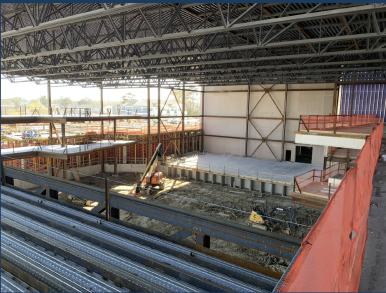When Navy veteran Leland Remias was preparing to launch his Newport News real estate startup, VroomBrick, he looked for every resource possible to help him learn about business and scaling up.
First, he completed an MBA from William & Mary in May. And in 2022, he participated in the Veteran Startup Challenge, a five-week intensive boot camp that teaches foundational skills of innovation and entrepreneurship to current and former service members.
“There’s no shortage of resources if you seek them out,” says Remias, who left the Navy as a lieutenant after five years. “It just boils down to seeking out what you need, what the opportunity is.”
There’s also no shortage of veterans — or veteran entrepreneurs — in Virginia.
The commonwealth ranks No. 5 among states with the most military veterans, with the U.S. Census Bureau estimating that 671,519 veterans — or nearly 8% of Virginia’s population — called Virginia home in 2021.
As of 2023, there were 63,321 veteran- owned businesses and 6,974 businesses co-owned by vets in Virginia, according to the U.S. Small Business Administration. Veteran-owned businesses make up about 5.9% of all businesses nationwide, but that percentage is nearly double in Hampton Roads, which has the nation’s highest concentration of veteran-owned businesses among metro areas with more than 1 million people, according to the Hampton Roads Planning District Commission.
But veteran-owned businesses in Virginia are hardly limited to Hampton Roads. For example, Alexandria-based fintech startup Parlay is led by veterans and military spouses. With five full-time workers and three contractors, Parlay was founded in 2022 and has raised $1.7 million.
Co-founders Alexandra McLeod and Jay Long turned for help with Parlay to organizations like Hivers & Strivers Capital — a Great Falls-based venture capital firm that exclusively invests in veteran-led companies — and the Tysons-based PenFed Foundation, which has a Veteran Entrepreneur Program connecting founders with mentors.
“I think one of the most incredible parts of being a veteran entrepreneur in Virginia is your biggest challenge is not access to resources but … navigating all of them,” says Long, a 2013 graduate of the U.S. Military Academy at West Point who served as an Army infantry officer through 2022. “Each accelerator had something different to teach us.”
The biggest benefit at PenFed Foundation, the charitable arm of Pentagon Federal Credit Union, was getting connected to the veteran ecosystem, Long says.
This spring, PenFed’s Veteran Entrepreneur Program changed its focus from a traditional accelerator to more of an incubator/consultant model, says program manager Matthew Boyd. He works with a cohort of five or six companies for a six-week intensive period, but offers up to a year of support, including mentorship. A cohort will begin in June, and then another in September, with plans to expand to three or four cohorts annually, he says. A national program, it’s open to veterans and military spouses and targets those who have a minimum viable product ready to launch or are in the seed round raising capital, are generating revenue and are ready to take their company to the next level, Boyd says.
Another Northern Virginia-based supporter of veteran entrepreneurs is Hivers & Strivers Capital. Founded in 2017, the VC firm has deployed $80 million and has 16 active veteran-owned companies in its portfolio, says co-founder and partner Doug Doan, an Army veteran and West Point graduate. A typical first check to a founder from Hivers & Strivers totals between $250,000 and $500,000 in exchange for 10% to 15% equity, he says, and the firm often increases backing as companies grow.
Because Virginia has so many veterans, most general entrepreneurial support organizations here also help a significant number of veteran founders. One example is Virginia Apex Accelerator. An accelerator for small businesses seeking to be government contractors, it’s administered by George Mason University and co-funded by the federal government. Statewide Director Lisa Wood says her team spends a lot of time helping veterans learn about the government procurement process. Veteran founders, she says, are “very open to new concepts and very driven to succeed.”
Another program aimed at veteran entrepreneurs is the Veterans Business Outreach Center at Old Dominion University’s Institute for Innovation and Entrepreneurship, funded partially by the SBA. Staff members travel around Virginia and West Virginia teaching the SBA’s Boots to Business classes, a free training program offered through the Department of Defense’s Transition Assistance Program.
Boots to Business is open to active-duty service members, veterans, U.S. military reservists and National Guard members, along with their dependents and transitioning service members. It includes a two-day classroom course and an eight-week online course. Participants learn how to evaluate business concepts and other foundational knowledge required to develop a business plan. “We’ll be teaching it 80 times this year,” says VBOC director Don Miller.
VBOC has helped eligible veterans, their dependents and transitioning service members start nearly 500 veteran- or veteran-family-owned businesses over the past decade, Miller says. “We’re not getting them started and walking away.”
Freelance writer Sandy John contributed to this story.
A sampling of resources for veteran entrepreneurs
Hivers & Strivers Capital
Venture capital fund that invests exclusively in companies led by U.S. military veterans
hiversandstriverscapital.com
Veteran Entrepreneur Program
Incubator/consultant model, working with five to six companies for six-week intensive period, with up to a year of support. Cohorts start in June and September.
penfedfoundation.org/how-we-help/veip
Veterans Entrepreneurs Scholars program at William & Mary
An intensive five-week entrepreneurship boot camp that trains current and former service members about innovation and entrepreneurship
wm.edu/offices/veterans/certificates/entrepreneurs
Veterans Startup Challenge
An initiative to train military veterans to create their own jobs through entrepreneurship and to begin careers in tech
veteranstartupchallenge.org
Virginia Small Business
Development Centers Offers a variety of resources for veteran-owned small businesses
virginiasbdc.org/veteran-owned-small-business-resources
Virginia APEX Accelerator
Offers classes and counseling for businesses that want to be government contractors, especially with the Department of Defense
virginiaapex.org
Veterans Business Outreach Center
Provides entrepreneurial development services to eligible veterans who own or are considering starting small businesses
ww1.odu.edu/iie/vboc



 Daniels was honored for “a career dedicated to positioning the commonwealth as a technology leader and promoting a thriving economy supported by a world-class workforce.” CACI’s chairman since January 2021, he previously served as chairman and CEO of Network Solutions and held several executive roles at Science Applications International Corp. (SAIC), among many other executive roles. He also was a former senior White House adviser on international technology and a senior adviser to the National Security Council.
Daniels was honored for “a career dedicated to positioning the commonwealth as a technology leader and promoting a thriving economy supported by a world-class workforce.” CACI’s chairman since January 2021, he previously served as chairman and CEO of Network Solutions and held several executive roles at Science Applications International Corp. (SAIC), among many other executive roles. He also was a former senior White House adviser on international technology and a senior adviser to the National Security Council.